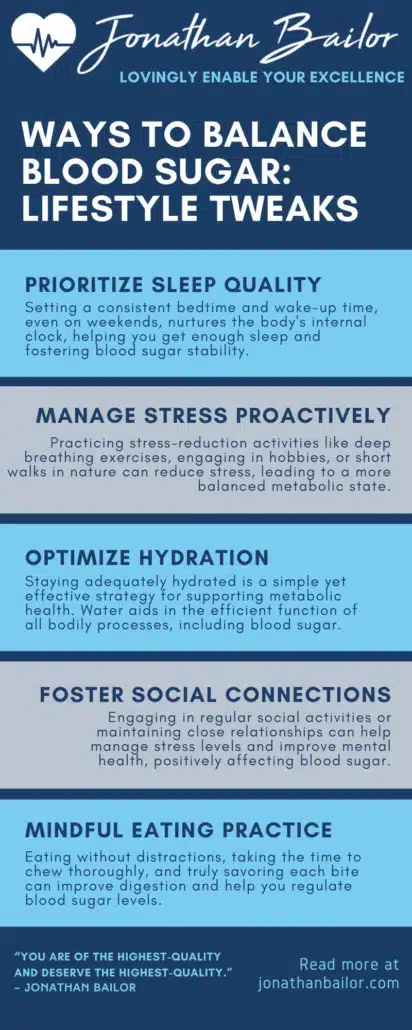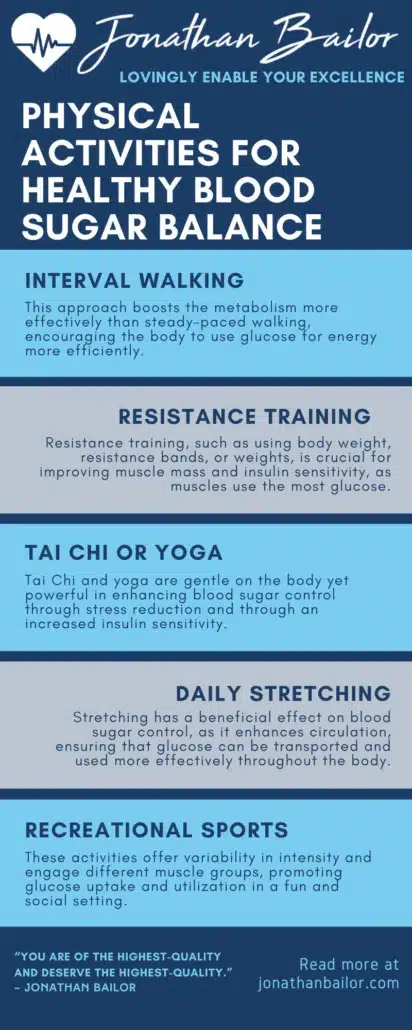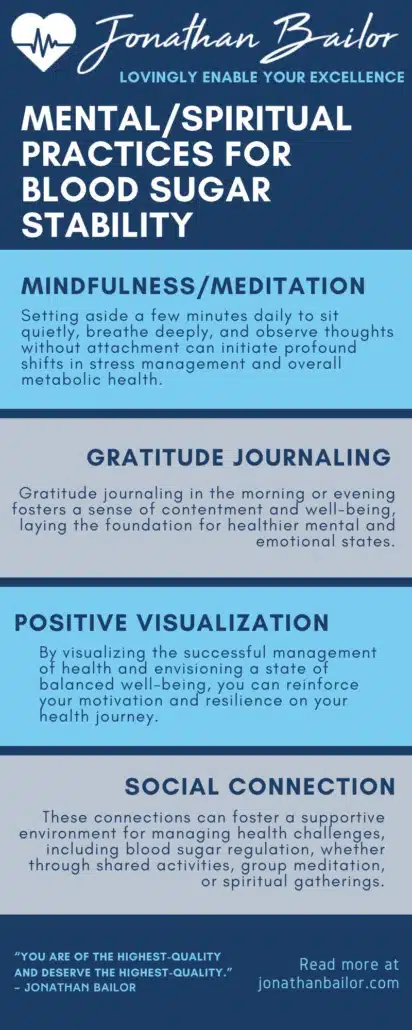19 Ways to Balance Blood Sugar for Optimal Metabolic Health
Navigating the day with steady energy, a clear mind, and a balanced mood might seem like a distant dream, especially in a world buzzing with quick fixes and ever-changing diet trends. Yet, as Jonathan Bailor discusses in this Hormone Health Guide, the key to unlocking this state of optimal well-being and vitality, particularly as we embrace the wisdom of our years, lies not in elusive, complex strategies but in understanding and harnessing the power of one critical aspect of our health: blood sugar balance.
Healthy blood sugar levels are the cornerstone of not just metabolic health but overall vitality. They influence everything from our energy levels to weight management, from the clarity of our thought processes to the stability of our moods. And yet, in the hustle of daily commitments and the vast sea of nutritional advice, finding straightforward, practical ways to maintain this balance can feel overwhelming.
This guide is crafted to cut through the noise, offering clear, actionable strategies that fit into real life. It’s not about overhauling your lifestyle overnight but about integrating small, manageable changes that collectively make a significant impact. The focus here is on empowerment with knowledge and practical tips that are easy to adopt, regardless of your dietary preferences or lifestyle.
In a world where health advice often seems to cater to the latest fads or the most complex scientific findings, this piece brings it back to the basics—to the strategies that stand the test of time and are backed by solid evidence. These are not just fleeting trends but are pillars of a healthy life, tailored to be inclusive, accessible, and, most importantly, effective.
So, whether the goal is to enhance energy levels, manage weight, or feel more in tune with your body, these strategies are designed to guide you toward a path of sustained well-being. It’s about making a choice today that your future self will thank you for—a step towards not just living but thriving.
With the promise of simplicity and the power of science-backed wisdom, this guide invites you on a journey to discover ways to balance blood sugar and manage high blood sugar levels for optimal metabolic health. It’s more than just a read; it’s a step toward transforming the understanding of health and the body, designed to be shared with those who matter most, spreading the message of wellness and vitality through the power of informed, conscious choices.
Harmonizing Life for Balanced Blood Sugar: Lifestyle Tweaks That Matter
In navigating the journey towards optimal metabolic health, it becomes clear that the path is not solely paved with the foods we eat or the exercise we engage in. Our overall lifestyle—how we rest, connect, and live—plays a critical role in balancing our blood sugar and achieving a state of well-being.
The following list explores key lifestyle changes that, while simple in concept, are profound in their impact on our metabolic health. These changes go beyond the conventional focus, offering a holistic approach that integrates seamlessly into daily life, underscoring the importance of a balanced environment, stress management, adequate hydration, social connections, and mindful practices.
By embracing these adjustments, we not only support our metabolic health but also enrich our lives with a more profound sense of harmony and vitality.
1. Prioritize Sleep Quality
Embracing the night as a restorative period can profoundly impact blood sugar regulation. Multiple studies indicate that sleep deprivation or poor sleep quality is a risk factor for insulin resistance. Ensuring a dark, cool, quiet environment encourages deeper sleep cycles, supporting hormonal balance. This hormonal equilibrium is crucial for regulating insulin and glucose levels.
Setting a consistent bedtime and wake-up time, even on weekends, nurtures the body’s internal clock, helping you get enough sleep and promoting a more efficient metabolic state that fosters blood sugar stability.
2. Manage Stress Proactively
Stress, often an overlooked factor, can affect blood sugar levels by releasing stress hormones like cortisol and adrenaline. These hormones can raise blood sugar levels and interfere with insulin sensitivity.
Incorporating stress-reduction activities like deep breathing exercises, engaging in hobbies, or even short walks in nature can mitigate this effect, contributing to a more balanced metabolic state.
3. Optimize Hydration
Staying adequately hydrated is a simple yet effective strategy for supporting metabolic health. Water aids in the efficient function of all bodily processes, including regulating blood sugar levels.
By choosing water or herbal teas over sugary beverages, you can avoid unnecessary blood sugar spikes while supporting overall hydration status, which is vital for optimal metabolic function.
4. Foster Social Connections
The strength of our social ties has a surprising but significant impact on our metabolic health. Engaging in regular social activities or maintaining close relationships can help manage stress levels and improve mental health, positively influencing blood sugar control.
Whether it’s family gatherings, outings with friends, or participating in community events, fostering social connections can contribute to a more balanced and healthy life.
5. Cultivate a Mindful Eating Environment
Although this section focuses on lifestyle changes beyond diet, the environment in which you eat can influence how the body processes and responds to food. Eating without distractions, taking the time to chew thoroughly, and truly savoring each bite can improve digestion and help you regulate blood sugar levels.
Creating a calm and focused eating environment encourages mindfulness, which can help recognize satiety cues and prevent overeating.
These lifestyle changes represent a holistic approach to health that acknowledges the complexity of our bodies and the interconnectedness of our lives. By adopting these practices, you embark on a path not just to control blood sugar and improve metabolic health but to a more harmonious and fulfilling life.

Feeling Better Is Priceless, That's Why We Don't Put A Price On It!
“It’s Like A Free and Medically Valid Version of Noom and Weight Watchers Online”
~ Dr. Doctor Matthew Oleshiak, MD
Click the 'LEARN MORE' button below for free lifetime access to the fast fix program developed by Jonathan and top Ivy League Medical Doctors
LEARN MOREP.S. It's not a free trial. It's not part of the program for free. The entire program is free, forever, for real! No credit card needed.
Nourishing Balance: Dietary Keys to Stable Blood Sugar
In the symphony of strategies that harmonize our metabolic health, the notes played by our dietary choices resonate with particular vibrancy. The food we consume is the fuel that powers the intricate machinery of our bodies, directly influencing our blood sugar levels and, by extension, our overall well-being.
As we look to fine-tune our diets to manage blood sugar levels, the following recommendations offer a blend of nutritional harmony and practicality. These dietary changes are designed not as fleeting trends but as sustainable, evidence-backed adjustments that enrich our health narrative, making each meal an opportunity to nurture our bodies.
1. Embrace Healthy Fats
Incorporating healthy fats into the diet—such as avocados, nuts, seeds, and olives—can help stabilize blood sugar levels by slowing the absorption of carbohydrates into the bloodstream. These nutrient-dense sources of energy not only keep you satiated longer but also support cellular health and inflammation control. Saturated fat, on the other hand, increases the risk of heart disease, high blood pressure, high cholesterol, and other health problems.
Making healthy fats a staple in meals and snacks ensures a steady source of energy throughout the day, preventing spikes and dips in blood sugar that can lead to cravings and energy slumps.
2. Prioritize High-Fiber Foods
Fiber positively affects blood sugar management by slowing the digestion and absorption of carbohydrates and sugar, helping keep blood sugar levels more consistent. Foods rich in insoluble and soluble fiber, such as leafy greens, berries, nuts, and seeds, should be central to your diet.
These foods not only aid in controlling blood sugar but also support digestive health and provide a wealth of vitamins and minerals.
3. Increase Lean Protein Intake
Lean protein sources like fish, poultry, legumes, and tofu provide essential nutrients without the added sugars that can spike blood sugar levels. Protein is vital for repairing and building tissues and can help maintain muscle mass, which is crucial for a healthy metabolism.
Including a source of lean protein in every meal and snack can help balance blood sugar levels by ensuring a slower, more steady release of energy.
4. Stay Hydrated with Water and Herbal Teas
Drinking sufficient water throughout the day is vital for overall health and can help manage blood sugar levels. Water does not directly lower blood sugar, but it helps to eliminate excess glucose through urine and keeps the body hydrated, aiding in the efficient processing of sugars.
Herbal teas, such as green tea, can also offer antioxidant benefits while supporting hydration and blood sugar balance.
5. Choose Low-Glycemic Index Foods
Foods with a low glycemic index (GI) are digested and absorbed more slowly, leading to a gradual rise in blood sugar levels rather than a spike. Focusing on low-GI foods, like most non-starchy vegetables, some fruits (such as berries and citrus), and legumes, can help maintain steady blood sugar levels and support sustained energy and satiety. (By contrast, blood sugar levels rise higher when you consume high-glycemic-index foods.)
These dietary adjustments are not about deprivation but about making informed choices that celebrate the abundance of nourishing options available. By aligning our diets with our body’s needs for balanced blood sugar, we set the stage for lasting health, vitality, and healthy body weight, making every bite count towards our journey to optimal well-being.

Energizing Harmony: Physical Activities for Blood Sugar Balance
Amidst the myriad elements that compose the mosaic of metabolic health, physical activity stands out as a dynamic and potent force for positive change. Moving our bodies isn’t just about burning calories or building muscle; it’s a profound dialogue between our physical selves and holistic well-being, affecting everything from blood sugar levels to mental clarity.
The following activities are curated not only to enhance this dialogue but to weave it seamlessly into the fabric of daily life, offering pathways to blood sugar stability through joyful movement and accessible regular exercise. These changes are invitations to explore the joy of movement and to discover how activity, in its many forms, can be a wellspring of health and balance.
1. Incorporate Interval Walking
Interval walking, alternating between brisk and moderate paces, can significantly impact blood sugar management. This approach boosts the metabolism more effectively than steady-paced walking, encouraging the body to use glucose for energy more efficiently.
Start with a warm-up at a moderate pace, then alternate one minute of brisk walking with two minutes of a more relaxed pace. This method not only breaks the monotony of routine walks but also invigorates the cardiovascular system and enhances insulin sensitivity.
2. Explore Resistance Training
Resistance training, such as using body weight, resistance bands, or weights, is crucial for improving muscle mass and insulin sensitivity. Muscles are the largest consumers of glucose in the body; thus, increasing muscle mass helps lower blood glucose levels.
Incorporating resistance exercises two to three times a week can significantly affect metabolic health. Exercises can be simple, like squats, push-ups, and lunges, and adjusted for any fitness level, emphasizing the importance of consistency over intensity.
3. Try Tai Chi or Yoga
Tai Chi and yoga are gentle on the body yet powerful in enhancing blood sugar control through stress reduction and increased insulin sensitivity. These practices combine mindful movements with deep breathing, fostering a state of relaxation that counters the stress-induced spikes in blood sugar.
Engaging in Tai Chi or yoga sessions regularly can also improve balance, flexibility, and mental focus, making them a multifaceted tool for health.
4. Engage in Daily Stretching
Incorporating stretching into daily routines can have surprisingly beneficial effects on blood sugar levels. Stretching enhances circulation, ensuring that glucose can be transported and used more effectively throughout the body.
A regular stretching routine, either in the morning or before bed, can increase flexibility, lower the risk of injury, and promote a sense of well-being that supports overall health goals.
5. Participate in Recreational Sports
Engaging in recreational sports, such as tennis, swimming, or cycling, can be an enjoyable way to stay active and manage blood sugar. These activities offer variability in intensity and engage different muscle groups, promoting glucose uptake and utilization in a fun and social setting.
Choosing a sport that brings joy and excitement ensures that the activity remains a consistent part of your lifestyle, underscoring the principle that the best exercise is the one that is most enjoyed and thus sustained over time.
These physical activity changes are more than mere exercises; they are steps toward a lifestyle that embraces movement as a source of joy and health.
Integrating these activities into the rhythm of daily life makes the path to balanced blood sugar and enhanced metabolic health achievable and enjoyable.

Serenity in Balance: Mental and Spiritual Practices for Blood Sugar Stability
In the intricate dance of maintaining balanced blood sugar and fostering metabolic health, the role of mental and spiritual well-being often plays a quiet yet profoundly impactful melody. This aspect of health care delves into the realms of our thoughts, emotions, and inner peace, recognizing that our mental state and spiritual health directly influence our physical well-being, including how our bodies regulate blood sugar.
The following practices are invitations to explore the depth of our internal landscapes, offering pathways to harmony that resonate well beyond the confines of physical health. These mental and spiritual changes are not mere tasks to check off a list but are transformative processes that beckon us to a deeper understanding of ourselves and our capacity for wellness.
1. Cultivate Mindfulness and Meditation
Mindfulness and meditation offer a sanctuary for the mind, reducing stress and its detrimental impact on blood sugar levels. By bringing your attention to the present moment without judgment, you can lower stress hormones like cortisol, which negatively affect blood sugar control.
Setting aside a few minutes daily to sit quietly, breathe deeply, and observe thoughts without attachment can initiate profound shifts in stress management and overall metabolic health.
2. Embrace Gratitude Journaling
Writing down things you are grateful for each day can transform your outlook on life, shifting focus from stress and worry to positivity and abundance. This shift in perspective can lower stress, improve mood, and indirectly support blood sugar regulation by mitigating the stress response.
Gratitude journaling in the morning or evening fosters a sense of contentment and well-being, laying the foundation for healthier mental and emotional states.
3. Engage in Positive Visualization
Positive visualization involves mentally picturing yourself achieving goals, embodying health, or experiencing happiness and peace. This practice can influence your mental state, reduce anxiety and stress, and positively impact your physical health, including your blood sugar levels.
By visualizing the successful management of health and envisioning a state of balanced well-being, you can reinforce your motivation and resilience on your health journey.
4. Seek Connection through Community or Spiritual Groups
Finding a sense of belonging and support within a community or spiritual group can offer emotional stability and reduce feelings of isolation and stress. These connections can foster a supportive environment for managing health challenges, including blood sugar regulation, whether through shared activities, group meditation, or spiritual gatherings.
The communal exchange of encouragement and experiences provides a network of support that bolsters mental and spiritual well-being.
These mental and spiritual practices are gateways to a more centered, peaceful existence that naturally supports the body’s ability to regulate blood sugar.
By weaving these practices into the fabric of daily life, the journey toward metabolic health becomes enriched with deeper meaning, offering a holistic approach to well-being that nurtures body, mind, and spirit.

Navigating Hormone Health: Frequently Asked Questions
Q1: What role do hormones play in overall health?
Hormones serve as the body’s chemical messengers, orchestrating a symphony of bodily functions that range from growth and metabolism to mood regulation and reproductive health. Their balance is crucial for the smooth operation of physiological processes.
When hormones are in harmony, our bodies function optimally, promoting well-being, energy, and longevity. However, when imbalances occur, they can lead to a variety of health issues, underscoring the importance of maintaining hormonal equilibrium for overall health.
Q2: How can I tell if my hormones are imbalanced?
Signs of hormonal imbalance can manifest in myriad ways, depending on which hormones are affected. Common indicators include unexplained weight fluctuations, persistent fatigue, mood swings, sleep disturbances, and changes in appetite or digestive issues.
Women may notice irregularities in their menstrual cycle or symptoms of menopause, while men might experience reduced muscle mass or changes in libido. Recognizing these signs is the first step toward addressing any underlying hormonal issues.
Q3: What are some natural ways to support hormone health?
Supporting hormone health naturally involves a holistic approach, focusing on a balanced diet rich in nutrients, regular physical activity, adequate sleep, and stress management techniques. Consuming a variety of vegetables, lean proteins, and healthy fats can provide the necessary building blocks for hormone production.
Exercise, particularly strength training and aerobic activities, can improve hormone regulation. Ensuring quality sleep and practicing mindfulness or relaxation techniques can also help balance hormone levels.
Q4: Can diet really affect my hormone levels?
Diet plays a pivotal role in hormone health. Certain foods can either support hormone production and balance or contribute to imbalances.
For example, foods high in refined sugars and unhealthy fats can disrupt insulin levels and exacerbate hormonal imbalances. Conversely, foods rich in omega-3 fatty acids, antioxidants, and fiber can support the body’s natural hormone regulation, illustrating a diet’s direct impact on hormonal health.
Q5: Are there specific lifestyle changes that benefit hormone health?
Yes, several lifestyle adjustments can significantly benefit hormone health. Prioritizing sleep is paramount, as insufficient rest can disrupt the production and regulation of key hormones. Managing stress through activities like yoga, meditation, or even simple breathing exercises can mitigate the adverse effects of cortisol, the stress hormone.
Additionally, reducing exposure to endocrine disruptors, found in certain plastics and personal care products, can further support hormone balance. Embracing these changes can foster a conducive environment for hormonal equilibrium.
A Path to Balance: Uniting for Blood Sugar Harmony
As we journey through the landscape of well-being, the exploration of balancing blood sugar emerges as a crucial thread, intertwining the essence of our health with the rhythm of our daily lives. This narrative extends an invitation to not only embrace individual transformation but to foster collective well-being by sharing these insights on blood sugar balance with those we hold dear.
Let this guide inspire conversations and connections, encouraging friends and family to join on social media or through personal emails. Let’s create a community united in the pursuit of optimal health, where blood sugar harmony plays a pivotal role in our shared journey toward vitality and balance.
Feeling Better Is Priceless, That's Why We Don't Put A Price On It!
“It’s Like A Free and Medically Valid Version of Noom and Weight Watchers Online”
~ Dr. Doctor Matthew Oleshiak, MD
Click the 'LEARN MORE' button below for free lifetime access to the fast fix program developed by Jonathan and top Ivy League Medical Doctors
LEARN MOREP.S. It's not a free trial. It's not part of the program for free. The entire program is free, forever, for real! No credit card needed.




